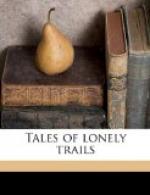A celebrated bear hunter and guide of the northwest told me that for twenty years he had been taking eastern ministers—preachers of the gospel—on hunting trips into the wild. He assured me that of all the bloody murderers—waders in gore, as he expressed it—these teachers of the gospel were the worst. The moment they got out into the wild they wanted to kill, kill, kill. He averred their natures seemed utterly to change.
In reading the books of hunters and in listening to their talks at Camp-fire Club dinners I have always been struck with the expression of what these hunters felt, what they thought they got out of hunting. The change from city to the open wilderness; the difference between noise, tumult, dirt, foul air, and the silence, the quiet, the cleanness and purity; the sweet breath of God’s country as so many called it; the beauty of forest and mountain; the wildness of ridge and valley; the wonder of wild animals in their native haunts; and the zest, the joy, the excitement, the magnificent thrill of the stalk and the chase. No one of them ever dwelt upon the kill! It was mentioned, as a result, an end, a consummation. How strange that hunters believed these were the attractions of the chase! They felt them, to be sure, in some degree, or they would not remember them. But they never realized that these sensations were only incidental to hunting.
Men take long rides, hundreds and thousands of miles, to hunt. They endure hardships, live in camps with absolute joy. They stalk through the forest, climb the craggy peaks, labor as giants in the building of the pyramids, all with a tight clutch on a deadly rifle. They are keen, intent, strained, quiveringly eager all with a tight clutch on a deadly rifle. If hunters think while on a stalk—which matter I doubt considerably—they think about the lay of the land, or the aspect of it, of the habits and possibilities of their quarry, of their labor and chances, and particularly of the vague unrealized sense of comfort, pleasure, satisfaction in the moment. Tight muscles, alert eyes, stealthy steps, stalk and run and crawl and climb, breathlessness, a hot close-pressed chest, thrill on thrill, and sheer bursting riot of nerve and vein—these are the ordinary sensations and actions of a hunter. No ascent too lofty—no descent too perilous for him then, if he is a man as well as a hunter!




